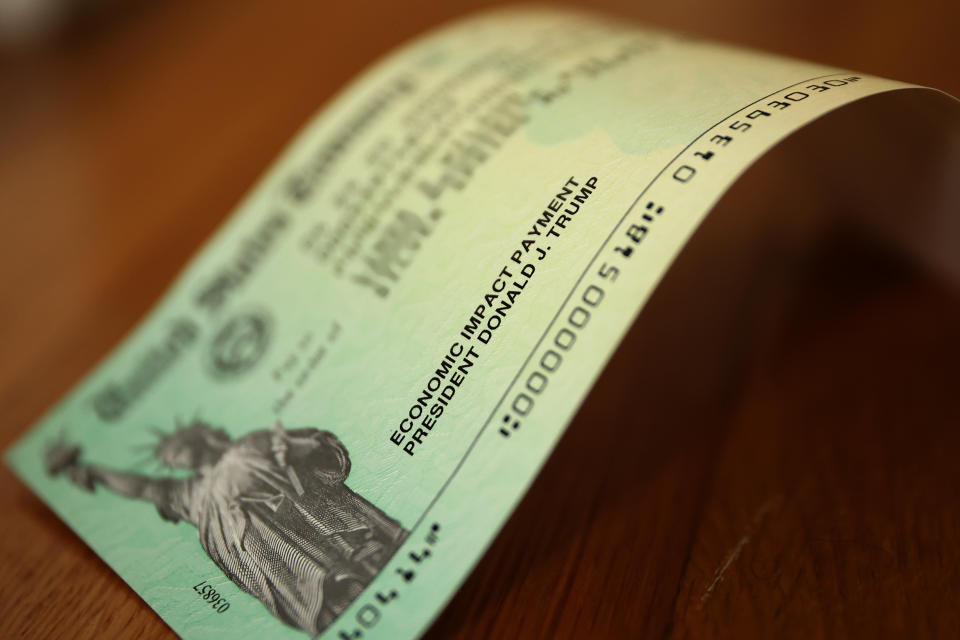Coronavirus stimulus checks: Many Americans would get more in GOP's second round of payments
Americans who got a first stimulus check would likely get a second one under the GOP’s new proposal. In several instances, some individuals would get more money.
The Republican plan unveiled on Monday proposes sending a second wave of stimulus checks of up to $1,200 to Americans, plus an additional $500 for any dependent — a key departure from the first round.
That means parents of older high schoolers and college students claimed as dependents would get the bonus, as well as those taking care of elderly loved ones who are dependents. In the first wave of payments, parents of child dependents under 17 were the only ones who got the extra $500.
“We also include, in the additional $500 for each dependent, some people that we didn’t intend to leave out last time, but we did,” Sen. Chuck Grassley (R-IA) said from the Senate floor on Monday. “So regardless of age, some of these dependents will now be helped.”
The Democrats’ stimulus check plan under the HEROES Act also proposed that taxpayers would receive the extra dependent bonus for any dependent claimed on their tax return. However, the proposal also suggested a larger benefit of $1,200 per dependent, instead of $500.

Who would be eligible this time?
Overall, the Republican proposal for the second wave of stimulus checks closely aligns with the first one when it comes to eligibility criteria.
Like the first round, single adults with income up to $75,000 would be eligible for the full check, while reduced checks would be available for single adults who earned between $75,001 and $99,000.
Read more: Coronavirus stimulus checks: What it means for your taxes
Married couples with income up to $150,000 would get $2,400, while those earning between $150,001 and $198,000 would receive reduced checks. That’s also the same as last time.
On top of that, Americans who qualify for the stimulus payment and have dependents would get the additional $500 per dependent.

Eligibility would be based on a taxpayer’s most recent tax return for either 2019 or 2018 and adjusted gross income. Similar to the first round, the benefit would also be available to Social Security recipients.
Who wouldn’t get a stimulus payment?
Single adults who make more than $99,000 and married couples who earn more than $198,000 wouldn’t receive stimulus checks.
Read more: Coronavirus stimulus check: How to get one if you don't file your taxes
Under the Republican proposal, those without a Social Security number and nonresident aliens — those who aren’t a U.S. citizen or U.S. national and don’t have a green card or have not passed the substantial presence test — would not be eligible for a payment.
By contrast, the Democrats’ plan proposes sending payments to people with Individual Taxpayer Identification Number (ITIN) filers and their families. The change would mean that more than 4.3 million adults and 3.5 million children would be eligible for the payment, according to ITEP.
Additionally, under the GOP’S plan, incarcerated individuals would not be eligible for a payment, which was the case for the first wave of payments. Anyone claimed as a dependent on another taxpayer’s returns would not be eligible, either.
Anyone who passed away before Jan. 1, 2020, also wouldn’t get a second check, a quirk that occurred during the first round.
Denitsa is a writer for Yahoo Finance and Cashay, a new personal finance website. Follow her on Twitter @denitsa_tsekova.
Read more:
Rich Americans' pullback in spending is hurting the economic recovery
Remote schooling leads to a 'shocking' disparity between rich and poor students
Read more personal finance information, news, and tips on Cashay
Follow Yahoo Finance on Twitter, Facebook, Instagram, Flipboard, SmartNews, LinkedIn, YouTube, and Reddit.

 money
money 

